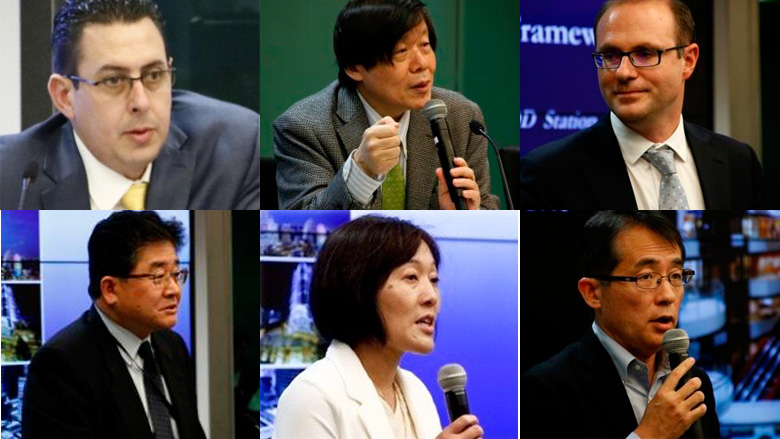
The World Bank Group Tokyo Development Learning Center (TDLC), a partnership of the World Bank and Government of Japan, co-hosted with the Ministry of Land, Infrastructure, Transport and Tourism (MLIT)[MI1] and Ministry of Finance (MOF) its Third TOD Knowledge Sharing Seminar on the “Application of Japanese Transit Oriented Development in Developing Countries” on May 17, 2016. In the opening remarks, Mr Yasusuke Tsukagoshi, Special Representative of the World Bank Tokyo Office mentioned that Japanese TOD is characterized by integrated development of transportation and land use, the close collaboration between public and private entities, and the method of land value capture,. Mr. Tsukagoshi also mentioned how TOD could contribute to the importance of Quality Infrastructure Investment.
“In Japan, everyone uses public transportation- the rich and the poor alike,” mentioned Dr. Akira Koshizawa, Professor Emeritus of University of Hokkaido in his key note speech. “The Great Kanto Earthquake hit in 1923, just when Japan started combating its urban development issues. This ironically enabled full re-development of Japanese cities.”
Japan integrated multiple elements in its re-development strategy including density concentration, diversity for station users, integration for space-saving, connectivity with surroundings, vibrancy and human scale and low carbon. “There are many hints that we can apply Japanese TOD to other countries,” Mr. Wataru Tanaka, Executive Officer and Deputy Head of Project Development Department of Nikken Sekkei LTD continued, “but coordination is critical.” The importance of proper demarcation and coordination in operation and management, and proper allocation of initial and operational costs were pointed out.
Mr. Delmo Manoel Pinho, Deputy Secretary of Transport for the Government of Rio de Janeiro stressed the importance of adopting a TOD philosophy in metropolitan planning and to conduct TOD pilots at stations like the Queimados station. “Smaller scale TOD projects can have a significant impact for the metropolitan region,” he added.
The final presentation during the seminar outlined a new analytical framework, the 3V Framework, designed to enable cities to leverage the unique characteristics of each mass transit station. “Beyond applying TOD to a neighborhood, rapidly developing cities have an opportunity to shape themselves more sustainably by developing the urban space around mass transit stations, but, since each station is unique, a differentiated approach is needed” mentioned Gerald Ollivier, Senior Infrastructure Specialist and TOD Community of Practice (COP) Lead of the World Bank. His presentation illustrated how the 3V framework can maximize the economic value of TOD station areas while adhering to the importance of the balance across three values of node, place and market. Mr. Ollivier also explained overall strategies to be applied in different types of nodes.
Ms. Kazuko Ishigaki, Director for International Negotiation Management of Japan Ministry of Infrastructure, Transport and Tourism, in her closing remarks, underlined, “TOD is indeed a joint action of the public sector and private sector. We need to understand the benefits of TOD more deeply and what it brings about to the society.”